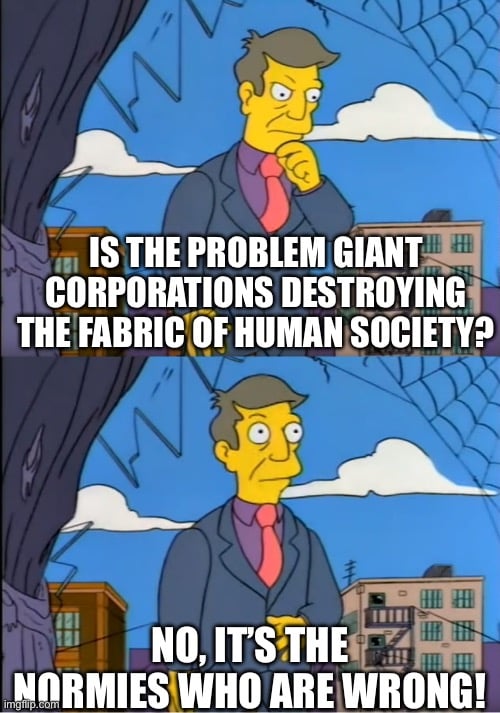How can we go back? We’re already on the way back. It’s called the Fediverse.
I help pay for my instance to operate, and it’s a cost I’m happy to help shoulder.
Us instance admins appreciate it I promise
Same, its on my best pi. 🥧
How is it running you a month?
Are you asking how much I donate per month?
Ehhhh, the OG internet connected better because all nodes were well connected. The Fediverse is a series of single servers that can’t even sync all data across themselves. It’s cute, but it’s post-it notes on strings atm
I wonder if there’s a more efficient way to have things sync in blocks or something. I honestly understand very little about server architecture, much less decentralized social network architecture. Maybe having a smaller number of “centralized” (community-run, redundant, independent) nodes distributing blocks of federated data to take load off the actual instance servers that would only need to upload bulk data to fewer places?
Maybe this isn’t very different from how it already operates. Fuck if I know.
Yep we have different lemmy/mastodon/etc… instances talking with one another. Anyone can set up something like activityhub. Its a fun place in my opinion!
Btw how do we stand on just blatantly copying and reposting material from reddit? I missed the announcement talking about that.
enjoy the mainstream memes and discussion, but avoid the algorithmic content slop from them. That’s how I see the fediverse. It’s a win in my book.
No. The fediverse is just more of the same mindless gargling and regurgitation of mainstream media excrement that the internet has become, but federated.
It lacks the creativity, originality, experimentation, wonder, sheer life of the old internet.
It’s just as dead, enshittified, and riddled with misinformation bots as everything else.
Step up!
Create!
deleted by creator
Looked like the least worst alternative to reddit (which was the least worst replacement for what the internet used to be before reddit, and facebook, and the like, killed it).
Turns out it’s mostly reddit reposts (often by bots, which is ironic since the originals were also reddit reposts posted by bots) and US politics garbage, and even more susceptible than Reddit to power hungry mods and echo chambers.
I guess I’m just addicted to doomscrolling. Which is almost as depressing as the fact that this inane crumb of utterly useless and purposeless garbage is by far the least worst furuncle in the rotting bot infested corpse of the internet.
and even more susceptible than Reddit to power hungry mods and echo chambers.
It’s not, because you can easily get around bans. You can go to a different instance and resubscribe to all the same communities.
That doesn’t prevent power hungry mods from modding hundreds of communities, or mods or admins from enshittifying the most popular communities (or whole instances) with absurd rules or misinformation bots, or any other of the abuses that were rampant on reddit and even more rampant here… sure, the users can migrate to some other community or instance, but most won’t (and migrating instances is significantly more work than simply unsubscribing from one subreddit and subscribing to another).
That doesn’t prevent power hungry mods from modding hundreds of communities, or mods or admins from enshittifying the most popular communities (or whole instances) with absurd rules or misinformation bots,
Then you jump to a similar community on another instance. In the long term the less restrictive place will win out. When the mods on the lemmy.world politics group nuked one of my highly upvoted submissions many months ago, I stopped submitting there and now all my submissions on that topic go to [email protected] instead. I carefully researched which instance/community has the most reasonable rules. Bottom line is users have much more power on Fediverse than Reddit.
And here I thought I was being elitist as a new member. I wonder what IRC is like these days. Discord is still cool with just certain friends in a server.
Whatever cool stuff someone posted on a forum 10-15 years ago can be found on the Fediverse, possibly even in better quality because people know how the internet works overall more then they did back then and we’re not all still using Windows XP. Now if you’re talking about the era of flash games, you shouldd try html5 games.
On the Fediverse you have the desk client, and web clients. If the fediverse isn’t creative you wouldn’t have a Misskey next to Maastodon which is it’s own thing all together not just another fork of Mastodon.
Can y make these claims make sense to me based on this logic I provided here.
My reading is that it’s not necessarily a problem with the platforms but society at large.
One example you mentioned: yes, html5 games (and just downloadable itch/steam games) exist and they fill the gap left by Flash games from a gameplay perspective maybe.
But the mainstream appeal of Flash games and animations was different to what we have now. The social phenomenon of people randomly hacking together terrible flash games isn’t the same as the current tiny indie game phenomenon. I feel like the old ones were a bigger piece of the average person’s internet usage than the new one (the average person’s internet usage being 5% LLM 5% web 5% email 25% gaming 30% video and 30% doomscrolling or something like that idk)
I’m struggling to put into words what I mean by this, my comment sounds really vague when I reread it. The specific creative outlet that Flash gave people is not equivalent to what we have now, and the specific entertainment experience of browsing and playing Flash games is different from the experience of scrolling through itch. Am I making more sense?
Like of course the different technologies are different, but it’s where it fits into our lives that it’s really different imo. Hell, we could say this about Flash itself for the last few years before it was discontinued. Just the two thoughts of Newgrounds in 2006 vs Newgrounds in 2016 and how they fit into the internet ecosystem and internet culture are enough to see the difference.
We would be better than ever, if not for the normification.
what exactly does that mean?
It’s what happened to the internet. Devices were dumbed down to make the internet accessible for everyone. Now the “normies” are also on the internet, whereas in the past they’d belittle you for spending time on the computer.
In time, the Fediverse will also be easily accessible. And where there are normies, you’ll find corporate enshittification.
Edit: thanks for the downvotes because I explained the word “normification”. You’re overthinking this. It’s a term that has been around since before Reddit became popular. It’s a term that stems from 4chan. I don’t like the term, I just explained it. And yes, the corpos are to blame but they couldn’t do the things they do without a certain user base. And that’s not your typical tech savvy user base. How is that so difficult to understand?
I’m not sure that categorizing people as “normies” is a great idea. nor is it a way to entice new people and voices to join and learn how to use the fediverse so that it can become a more reliable place.
i think blaming enshittification on “normies” is a lot easier than holding greedy corporations accountable for directly making everything worse. it’s surely easier, but the real issue remains unchecked.
if anything, it’s a good thing that more people are learning how much better the fediverse is. it helps the fediverse get stronger, not weaker.
“us” vs “them” is not a mindset that will produce anything except cesspools of toxicity. at least imho.
I didn’t coin the term and I too believe it’s a huge generalization. However, “simpler” people are more susceptible to ads. The “normies” in question are the ones that don’t use adblockers, they believe ads are normal and they believe ads don’t affect them. Corporations capitalize on that. Better tech education would definitely help take some power away from corporations.
Edit: even now you’ll find people that use Lemmy apps that have ads. The bigger the user base, the more greedy companies will find ways of exploiting the Fediverse.
Better tech education would definitely help take some power away from corporations
If you truly believe that, then vilifying more “simple” and less tech-savvy individuals is not the way to do it. Don’t be angry that they click on ads. Be angry that they’ve been poisoned to think that behavior is normal on the internet.
Education is absolutely possible for those new to things like the fediverse. But education doesn’t work when you use those labels for people. It widens the gap, it doesn’t close it.
I was a normie once. I too fell for misinformation in the past. If it wasn’t for the freely available information on the internet, I wouldn’t be here today.
You went ahead and actually gathered the correct information. This is not what the “normies” in question do. Look, I didn’t coin the term nor do I approve of the use of this term. I just wanted to explain what the other person meant with “normification”.
blaming enshittification on “normies”
What’s really annoying is it’s straight out of the corpo playbook.
“We’re not responsible for ______, you are because you didn’t do enough ________”.
The most blatant is “global warming” and “ate too much meat/didn’t recycle enough/made poor choices with your car” and so on.
It’d be nice if people would stop trying to blame the worst offenses being perpetuated on people by billionaires and their pet corporations on personal choices, because it’s hot liquid bullshit.
normies
Honestly some normies would help us talk about something different than US politics, linux and being trans femboys. Honestly, we’d have some diversity in content. I’d like that.
I think it would make discussions about US politics even worse. But I agree with the rest. I personally would also like to have a more broad user base. That’d definitely spark more interesting discussions. Lemmy is a very weird echo chamber right now. It’s just very important that no one in the Fediverse starts to capitalize on them. That’d be the moment enshittification starts. And that will happen once the mainstream people come pouring in because greed will always corrupt the ones who have some form of power. Someone will take advantage of this.
We could have separate instances for the normies and for the femboy linux users. And then, everybody can choose which instances to block/follow.
Internet? You mean the WiFi /s
No I mean the modem on my hard drive not the wifi.

With community visibility, there is plenty of room to form these communities that regular people can’t access for those who want that.
I can imagine an instance with a whole collection of insider communities. In fact, it’s already happened.
In time, the Fediverse will also be easily accessible. And where there are normies, you’ll find corporate enshittification.
No, because corporations cannot buy the Fediverse.
Couldn’t they “convince” instance admins to include ads? Couldn’t they flood communities with influencers? Couldn’t they promote Lemmy apps that have ads?
You are severely underestimating the criminal energy and creativity of these corporations.
Edit: reddit turned to shit way before the platform itself was up for sale. No need to buy the platform, bots and influencers are enough.
Couldn’t they “convince” instance admins to include ads?
Yes. One at a time. But the cannot “buy Lemmy” which is what a CEO would want to do.
No one needs to buy Lemmy to enshitify it. All of the above and many more methods would result in a shit experience.
Normification is a facet of our undemocratic capitalism. As you see yourself as a consumer of the internet and not a citizen, you mostly assume that a thing being
- popular
- monetizable
- and convenient
is always preferable.
So the internet continues to have a huge potential to host many cool places, but
- they can’t reach users that might be interested
- gaining support from small donations is difficult
- and they can’t integrate a complete set of features, accessibility, design and content moderation.
If you ask an average internet user about these places, it’s a common response to say they’re weird as in not normal. If you dig a bit for what they mean, it’s usually the above. Nobody is there, it can’t make money and it doesn’t have all the things.
…pardon?
you automatically assume I’m some weird corporate drone? you’re not exactly making your case very clear and you sound patronizing.
I’m not entirely certain who this rant is for, but i can’t imagine anyone who is labeled as a “consumer of the internet and not a citizen” is going to take you seriously.
and for that matter, those with good heads on their shoulders won’t either.
Stop blaming random people for the bullshit that corporations do and get away with. you’re pointing fingers at the wrong people and it makes your cause look fabricated.
Is this some kind of attack on certain minority groups or am I over thinking this comment? I googled what normification meant and the results gave me some bad vibes regarding this comments direction.
It’s not an attack on certain minority groups unless you consider “normal average person” a minority group.
It’s just a little bit of the old nerd superiority complex leaking out with a new word attached to it.
The Fediverse is a bit more like the old USENET days in some regards, but ultimately if it ever becomes more popular the same assholes that ruin other online experiences will also wind up here.
What made the Internet more exciting 30 years ago was that it was mostly comprised of the well educated and dedicated hobbyists, who had it in their best interest to generally keep things decent. We didn’t have the uber-lock-in of a handful of massive companies running everything.
It’s all Eternal September. There’s no going back at this point — any new medium that becomes popular will attract the same forces making the current Internet worse.
Exactly.
I’m interested in distributed applications (think BitTorrent, not ActivityPub), and my primary concern here is filtering. I want to be able to only see content from people I trust and people they trust (and so on), and if I do that well, I won’t have to see a ton of crap. That’s how regular relationships work, and I’d like to try my hand at it with anonymous relationships. Think something like Web of Trust, but adjusted for larger networks of people.
That sounds awesome and I’d love to use it.
Same. Unfortunately, it’s nowhere near done yet. 😅
The Fediverse by design prevents this, while the internet of the old age had little if any guardrails against this specially since the platforms never really federated with another.
Did forum sites even federate? One forum sites would be dead and the next would have more activity. But what if the other forum with less activity was the one you wanted to use? The old internet was a good start but there’s a reason why it’s dominated by Instagram and Facebook, while email, you can use mostly any provider and not feel like you’re left out.
The Fediverse by design prevents this, while the internet of the old age had little if any guardrails against this specially since the platforms never really federated with another.
I see someone is too young to remember USENET.
if it ever becomes more popular the same assholes that ruin other online experiences will also wind up here.
That’s kind of the glory of the fediverse, though. We can have communities using the same protocol that never interact with each other.
There can be completely separate fediverses that cater to different people.
The fediverse is just a barnacle on the larger Internet at this point. It has to become more - we need to make our own web
The Fediverse is still a new concept and it’s gaining more usage then most other open source social medias. It’s the best we have, and more and more people land on it. (atleast going by some Mastodon metrics.) It’s not the biggest, but it’s actually impressive for an an opensource project what you do have for it’s userbase. I wish some people would understand that to an extent.
We need a faster safer quantum proof forward secret timing attack proof version of tor
It’s not unless you are operating your own instance.
Or at the least, avoid the major instances and use smaller instances from individuals.
2 ways to go back:
-
Corporations become less greedy.
-
Consumers and businesses stop tolerating abuse and consider other options that will temporarily inconvenience them.
Neither one seems likely. If it were we simply wouldn’t be here in the first place.
A few of us still remembers option 3) Regulation And also 4) Properly working anti-trust laws.
Those are both the same, and would fall under #2.
I’d argue there’s enough difference there to flag them separately. The original number two is more about personal responsibility; choose a different retailer, go to a different place, etc. Voting with your wallet so to speak.
Government regulation, while it’s still about people pushing back against companies, with the state of most western governments at the moment you can’t assume they will automatically have the public’s back. So there’s a tie in to the personal responsibility aspect by electing representatives who represent your interests, but given that’s not always feasible (either because not enough people share that view to get someone elected or because there isn’t a suitable candidate available to support) I would argue it’s distinct enough to warrant its own category.
Regulations and anti trust laws would both fall under a government intervention category though I think.
You are conflating Consumers with Citizens, a classic pitfall of modern neoliberal democracies.
Just because people willingly Consume a Product does not mean they think The Product is good or even that it should exist at all. Neoliberalism is unable to acknowledge that, because Everything is a Market and the Market is Infallible.
In reality, the game theory is such that individuals may not have the means to get out of the local minimum they found themselves stuck in. Prisoner’s dilemma and all that. That’s what representative democracy is supposed to solve, when it isn’t captured by ideology and corporate interests.
You are conflating Consumers with Citizens
I’m actually not, and my word choice was intentional. If you’re not consuming these goods then you hold no leverage, and probably don’t care.
Do you not consume a single Google/Meta/Microsoft product or do you not care about their abhorrent business practices?
Yes and no.
I don’t understand.
Then you’re knowingly engaging in the consumption of abusive products? Do you not see how you have literally no leverage whatsoever as a consumer?
Removed by mod
It isn’t just corporations that have ruined everything, it’s spammers and scammers and cybercriminals too. Searching any topic these days is a crapshoot, with a high likelihood of falling into a spammer’s tarpit.
To me it feels like the internet is evolving into a virtual Dark Forest. We float around in these little bubbles of sanity, hiding amid a yawning expanse of seething chaos.
As long as people need money other people will try to find opportunities to make it, not everyone has the same moral boundaries.
People have talked about this for a long time it doesn’t seem like there is an idea driven way out. This is the road.
1 can be solved with regulation or nationalization. Services online should be public services. Like school, police, roads. You can still have private alternatives too.
History tells us there’s also a release valve of a swift brick to the side of the head, one brick per billionaire.
It sounds messier than paying taxes, to me. But I’m not a billionaire, so I can’t say I understand their motives.
im doing 2 actually.
That’s great but it takes more than 1, or even 1M people. It has to be enough people that anti-consumer shitfuckery is no longer profitable.
-
Libraries should evolve to play a larger role in the internet, theyve been trying to reinvent themselves and i think this best aligns with their spiritual purpose. Some ideas:
Caretakers of digital archives.
Caretakers of relevant open source projects.
Could I get a free domain with my library card?
Could I get free api access to mapping or other localized data?
Should libraries host local fediverse instances for civic users? (think police, firefighter alert, other community related feeds)
It’s fascinating how the absolute majority of people is trying to solve both social and technical problems at the same time via only social or only technical means. Again and again.
You need both.
Fediverse works right for moderation, but technically communities and users are part of an instance, and an instance is a physical thing that may go down. Just like most of our Web has vanished. And also, of course, it uses Web technologies.
Further my idea as to what should be done about this (one approach is Nostr, unloved here because of people who use it ; I also think it’s too primitive):
The storage must be full p2p. Like Freenet, but probably optimized so that people would only store what they themselves need, and give some space to others in the communities they participate in. Not to all the network, like Freenet, but only to whom they want.
The identities should be “federated”, as in communities allowing moderation. Moderation should be done via signed “delete” records, and users would then not replicate “deleted” information.
This way even when “an instance goes down” (say, instance admin has lost their private key or something like that), its stuff will still be replicated.
One can even make “an instance” inherit another instance (again, instance admin has lost their private key or, say, someone has stolen it), so that its users would replicate that.
One can imagine many mechanisms on top of that. But what’s described would allow libraries and allows a thing similar to DNS (again, like a community, to which you subscribe for naming service that associates names with entities) and a thing similar to a static website, and something like Usenet with user identities, moderation and communities.
Dynamic websites are possible too - but I’m not really knowledgeable about smart contracts and such required for it.
I’m actually describing something in the middle of a few things far smarter people are already doing.
This would allow agility between social and technical solutions.
I’m very much onboard with this. Idk if I’d say it’s the libraries job though, I think it should be at the city level for community instances.
The library is appealing to me because:
Precedence: pre internet I could connect to the library over a landlines and access the library and community news.
Expertise: not necessarily deep tech expertise, but with information retrieval, curation, education.
Community access: libraries are a municipal service with brick and mortar locations, and are heavily involved with community/public engagement.
For clarity, on the fediverse instance aspect. I was thinking more read only, with users being more official organizations with a barrier of entry vs. The general public. I personally wouldn’t want libraries to be moderating public discourse - this should be arms reach. And wouldn’t want them worrying about liability.
Public information (like safety bulletins for example) shouldn’t exclusively be sitting on a for profit ad platform, it’s bizarre.
How did we get here? Adtech, tracking, monetization.
Can we go back? By removing the ubiquitous affiliate marketing financial incentives, so no.
Yeah man. Last time YouTube was good was when people were making videos just for fun, not for clout.
I’ve thought about this. Essentially, whenever a channel gets moderately successful they will be contacted by various agencies trying to ‘sponsor’ them.
All the people that make video for fun hardly get seen, and if they do it’s not long before they sell out.
Yes, sadly this is the way :(
Don’t be silly, the proletariat just needs to unite, seize the nuclear stockpiles of at least two nations capable of destroying all life on earth in defense of the oligarchy’s hoards, and then decentralize ownership of the global communication infrastructure.
Easy.
Nukes are an option, yes.
But as the recent event with exploding pagers has reminded us, global logistics and also systems’ complexity allow for many funny things.
Go back to site directories.
Curate your news feed.
Stop using a single corporate search engine.
Participate in online social communities, not in social media.
Love that last line. Will remember.
Hah, I was quite proud of that one. Thanks!
can we go back
no
Yes, selfhost most essential services like mail, messengers, web search, piped frontend, vpn, and other things like gitea/forgejo and jellyfin, web 3.0 will be federated network
Isn’t web 3.0 the whole crypto ntf bullshit. Maybe we skip that one and go straight to 4.0
I think in general it’s supposed to be about decentralisation, but god knows scammers will hop straight onto anything with “point-oh” in the name
Exactly. Blockchain is decentralized, so a lot of people have jumped to that, but it really doesn’t have to be. I’m interested in distributed projects, which goes a step further than federation, and I think that is the gold standard for an open internet.
Gaben is that you? Where half-life 3?
Shhh! You’ll scare him off!
Web 2.0 Episode 2.
Back to 1.0, Javascript is pollution
Web 4.0: I can actually safely tip every dude who made a useful video/website 0.01 cents and neither side will have to pay any extra fees so it is actually worth to tip, it will just be p2p money using the processing power of the sender and the receiver without buttcoin vultures trying to fuck with it. That was what web 3.0 was supposed to have been 13 years ago, but between the technical limitations and those web3 shitasses’ greed, we’re left almost where we started…
We’re nowhere closer to frictionless, costless money transfer than we were 13 years ago, are we?
Some websites dont allow selfhosted mails, they want one of the big names.
You can get pretty far with setting up DNS entries properly. I just moved most of my accounts to my custom domain (hosting is at Tuta), and I haven’t had any issues yet. I find value in paying for hosting, but I think I could self-host if I needed to.
Creating a closed network on the Internet where any commercialization and domination are prohibited might help?
Something like Tor/freenet/I2P, but less shady (I know it’s not meant to be like this), open and accessible to anyone.
Edit: I remembered about gemini protocol, where you get
lightweight online space where documents are just documents, in the interests of every reader’s privacy, attention and bandwidth
Perfect for the new better internet, huh?
For Android/iOS users, there’s a client called Lagrange on F-droid and Testflight
TIL - there is something called Gopher and Gemini. Looks interesting, will read more on it.
Neither is all that great in practice.
Gopher has many problems as a protocol. The original versions of HTTP had much the same problems, such as closing the connection at the end of a transfer rather than having a length header or a signal that the connection is actually done. HTTP went on to fix most of those problems, but Gopher never got the chance. Gopher+ started fixing it up, but it was a victim of bad timing. The Mosaic browser was released shortly after Gopher+ and everyone started switching over. To my knowledge, nobody has ever implemented Gopher+ on either a client or server. Not even after over 20 years of a “revival” movement.
Gemini intentionally limits things, such as not having inline images. This is supposed to be done to keep out methods that have been historically used to track users, but things don’t work that way. I can just as easily send my logs to a data broker without using a pixel tracker if that’s what I want to do.
In the end, you can just use HTTP with a static web page, zero cookies, and no JavaScript. That’s what I ended up doing for my old blog (after offering a Gemini version for a while), including converting a bunch of YouTube
<iframe>tags to linked screenshots so you don’t even get YouTube cookies.That’s been my take on the whole ‘use gopher/gemini!’ bandwagon. Nice idea, but the solution to the problem leads to more problems that need solutions, and we’ve come up with solutions to those, but on other protocols.
And I mean, if I stab someone in the face with a screwdriver, the misuse of the screwdriver isn’t in some way specific to the screwdriver and thus nobody should use screwdrivers.
Same thing with all the nonsense a modern website does: HTTP is fine, it’s just being used by shitheads. You could make a prviacy-respecting website that’s not tracking you or engaging in any sort of shifty bullshit, but someone at some point decided that was the only way to make money on the Internet, and here we are.
Fyi, there’s a portal site: gemini://medusae.space/
(http version if you’re not on gemini yet)
When you remove the barriers to entry, the average quality users decreases, leading to an increase of corporate interest in an attempt to market to them all. These corporations do not care about the environment, and they run what the masses haven’t yet trashed in order to commodify it for maximum profit.
First the planet, then the Internet, next who knows? Maybe the entire human genome. Soon everyone will have to pay to remove dream ads and there will be a paywall inhibiting serotonin production without a subscription.
Indeed, Reddit was a great example of this. All of the stupid things they tried to pull off in the past few years (selling user data, turning off the API, insulting their users, VPN blocking, to name a few) would have not worked when they were a growing website. Now that they have so many low quality users, they can do that successfully because they know that said users are too dumb to realize how they’re being abused. Even larger websites like Twitter and Facebook operate this way.
The takeaway here is: don’t focus on having many users, focus on having good users. All relationships are a two-way street, and if you’re on the side of the street with too many people, you don’t have any personal leverage on your own. It’s in your best interests to get out of that relationship.
Cyberpunk, let’s go 😂
Not sure this has been said yet, but Neocities is a pretty great throwback to GeoCities and the early 2000’s web.
All a bunch of small, handcrafted websites and personal blogs by individuals and small groups.
Exploring feels like I remember back in the early 2000’s as a teen. Crazy and weird sites, hidden links and easter eggs, ARGs, random annon comments you can post to a wall, .gifs all over, pixel art, hacker manifestos, links to other similar sites, etc.
The Fediverse is pretty great too.
I wish there were more site directories curated by communities, that would reduce my reliance on search engines for sure. RSS is great, I’ve been using that to help build my personal content feed.
neocities
this is very nice thank you
Absolutely!
Oh my gosh, there’s webrings! That used to be such a good way to find new websites in a given topic.
Yes!
The Fediverse is as close as I’ve gotten to Internet the way it used to be, and I donate to the instances I use in order to keep it that way. I wish everyone would.
Capitalism. No.
I totally agree. Corporate interests and rampant consumerism have ruined the majority of the internet.
Glad we still have refuges like lemmy though to take solace in. Proportionally we’re a smaller part, but absolutely I’d say we’re about the same or larger than in the 2000s.
we’re a smaller part
Quality trumps quantity anytime.
Oh absolutely. I exclusively use Lemmy now for social media, my online experience is absolutely amazing as a result. My love for the internet has returned
New rule: programmatic advertising is illegal
The genie is already out of the bottle BUT, one solution would be to raise the barrier to entry again.
Return the internet to the pre-“smart” phone era, in which a minimum bar of effort and knowledge needed to be present in order to connect and participate on the web.
In 2008~2010, the flood gates opened for all the normies to stampede in and everything has been downhill since then.
I agree to an extent, but the problem is not so much the normies themselves as it is the massive commercial market they represent. You might point to mainstream social media as evidence of a problem with the people themselves, but you would be overlooking the fact that the surveillance and attention economies have meant these social media platforms are deliberately designed to position people against one another to drive engagement so these companies can charge more to advertisers. Discourse on the internet isn’t getting worse because there are more bad people online, it’s getting worse because companies have a financial incentive to turn us into bad people when we are online.
The normies are not the problem, they are the victims. The abusers are the giant corporation manipulating the masses and monetizing a publicly funded infrastructure for their own gains.
The point isn’t “it’s their fault”. But it changes the dynamic.
An enthusiast community can, for good and bad, largely self regulate. It’s easier to keep corporate interests either out, or engaging on your terms.
Once the community grows to include a high enough proportion of casual participants, that ability goes away, because manipulations that don’t work on inquisitive expert audiences do work on less informed ones, and less willing to question. It’s harder to establish who actually knows what they’re talking about by reputation, it’s harder to weed out the trolls from the naive, and it’s just generally harder to keep the focus of the community where you want it to be.
Corporations are one of the groups of bad actors manipulating that difference in dynamics, but the dynamics are different because of the large influx of people who don’t understand as much and aren’t trying to.
Aren’t we already doing that though with Mastodon, Lemmy etc?
I’m not saying there are no enthusiast spaces. I’m just explaining some of the tradeoffs that come with too low of a barrier entry when forming a community.
You want to be welcoming and accessible, not intimidating, etc, and I’m not saying any of that is bad. But you lose some of the magic where the whole community is relatively enthusiastic and has a shared vision for what it is when it’s easy for anyone to join and pull their own way.
We’re in Eternal September now. Have been for a few decades.
Return the internet to the pre-“smart” phone era, in which a minimum bar of effort and knowledge needed to be present in order to connect and participate on the web.
Yeah. I think that’s happening now. The public will discover the Fediverse, but I’m not sure if they’ll be welcomed into every community here.
How about BBSs? If you want to spam at 1200 baud, you had better be dedicated.
As someone who lived through that era, I can assure you that throughput is no deterrence to shitheads, morons, asshattery, and annoyance.
(Also, if you think Fediverse or even Reddit mods are bad, let me introduce you to the 1988 BBS Sysop.)
This. Lemmy is the way to go. Decentralized Communities connected via API.
I don’t see many other possibilities. The system needs a “free for ever” mechanic or big money shits into everything.
Lemmy is the way to go. Decentralized Communities connected via API.
This only works to a degree. Eventually, the communities that allow people to register most easily and see the most active content become the overwhelming majority of the content on the system. And if these communities don’t do a good job of self-policing, they just become mini-2008-style Reddits, filling up with the same bot accounts and serial assholes and sex pests that degraded the original.
Bigger sites start swamping smaller sites with traffic and overwhelming the capacity of smaller communities, so you get waves of defederation and new Walled Gardens of content.
The issue isn’t the technology, its the participants in that technology. Too many malicious actors piling onto a platform and either corrupting the administration or degrading the quality of content will inevitably lead to enshitification.
Federation only mitigates this by allowing smaller instances to break away and abandon larger ones. It does nothing to screen the sincere and human actors from the malicious and automatic accounts.
the communities that allow people to register most easily and see the most active content become the overwhelming majority of the content on the system.
hasnt this already happened with lemmy.world being the Big One?
They’re leading the pack. Although, that could change if some supermassive community like Threads ever implemented a Lemmy API.
Still a relatively slight difference in scale between .world and Reddit compared to, say, .world and shi.tjustworks or lem.ee.
How does Threads federation work compared to Mastodon? Do they have an allow list?
Mastodon users can subscribe to Lemmy communities so I’m curious if Threads can already federate with Lemmy.
If they can, I’ve never seen it. No Threads content in any Lemmy instance I’m aware of and no way to use the Threads app as a client for lemmy.world or any of the others.
Yeah I’ve never seen it either. However, I was curious if it was because instances were blocking it (as in fedipact).
Checking out Lemmy.world, I noticed threads is actually listed as a linked server. So at some point, lemmy.world has traded content with threads.net.
Though I can’t actually find the content. And there don’t seem to be any threads.net users (except a couple who wrote it in their display name as some sort of joke), so perhaps there are some threads users who are following lemmy communities but haven’t commented (or aren’t able to)?
so far, the threads implementation is similar to the mastadon ‘microblog’ model. i suspect they could interact with the new lemmy pieces that allow that part of the protocol on lemmy systems that dont block them.
i picked mbin so i could have access to both the lemmy content and microblog content. ive been following a few threads accounts and have no intention of blocking them.






























